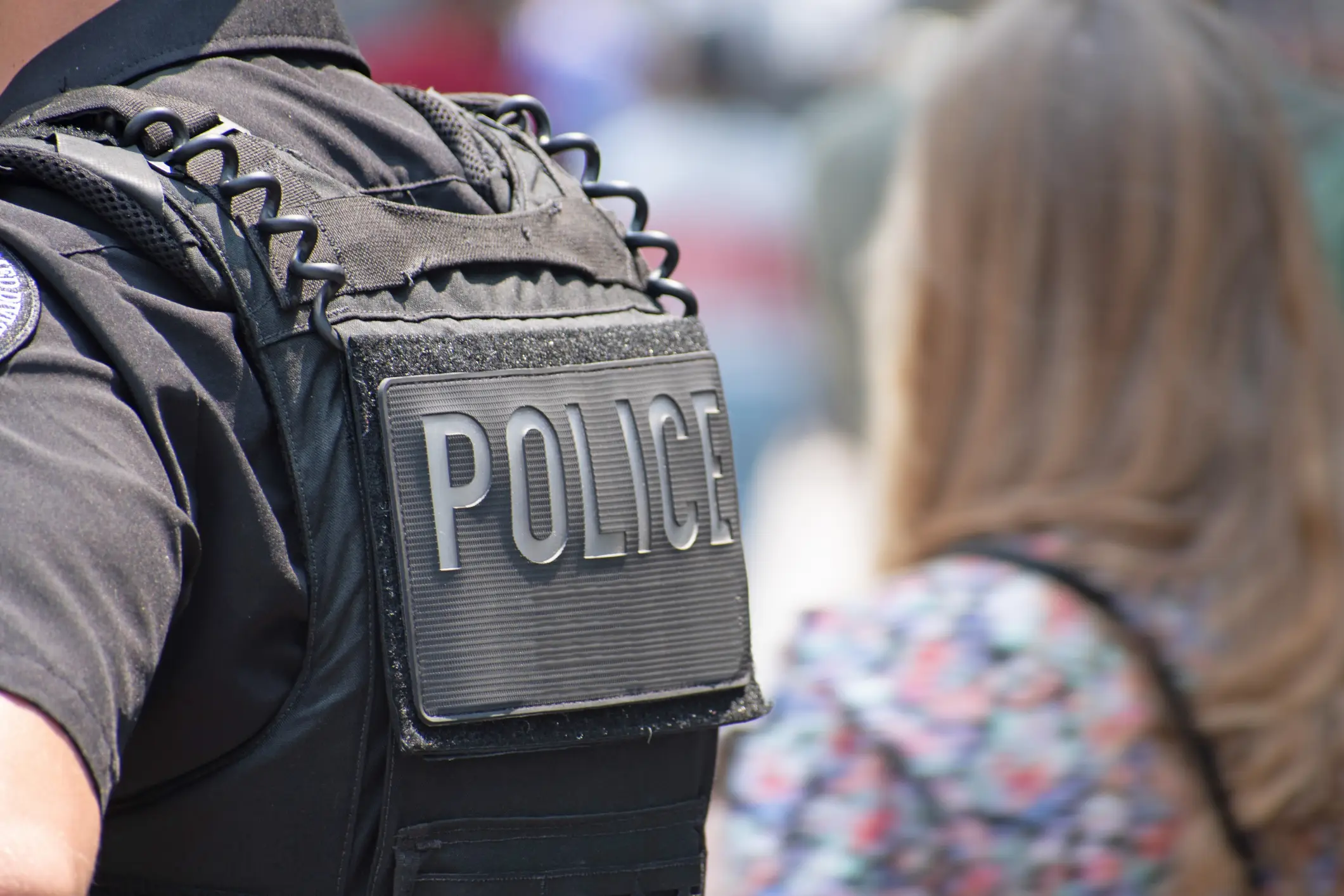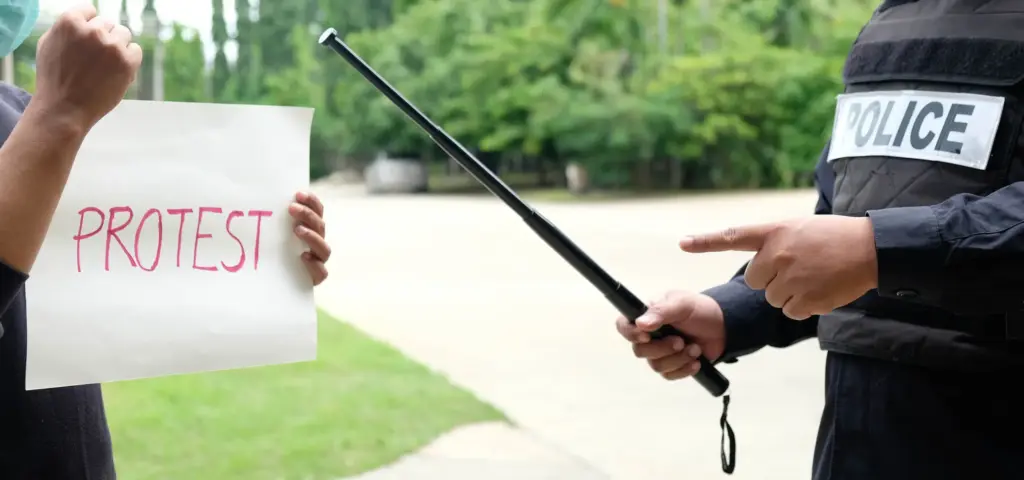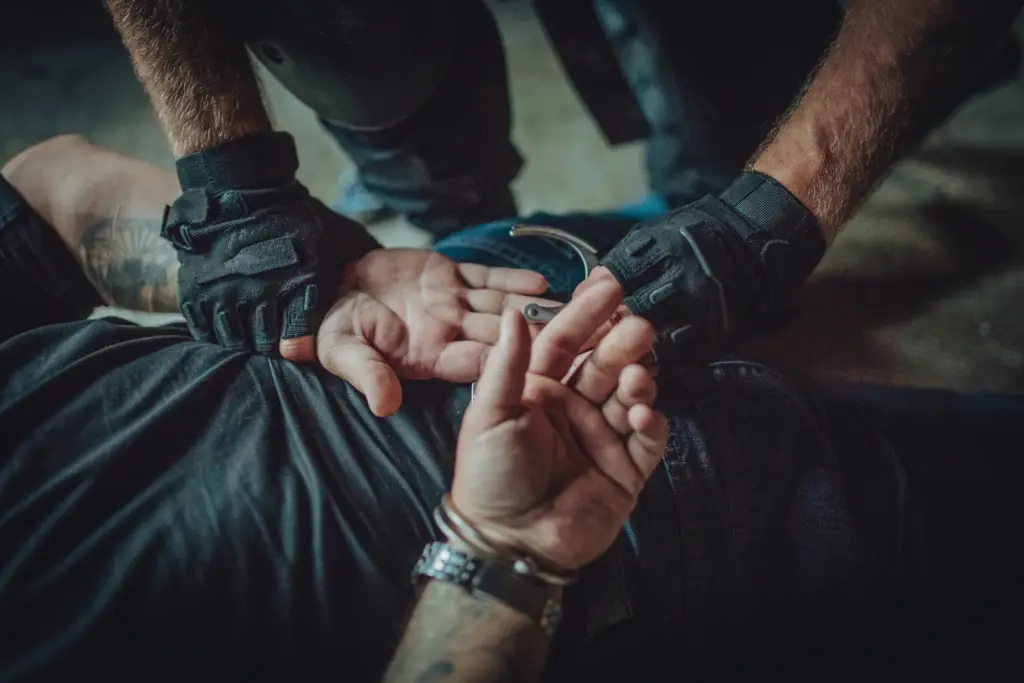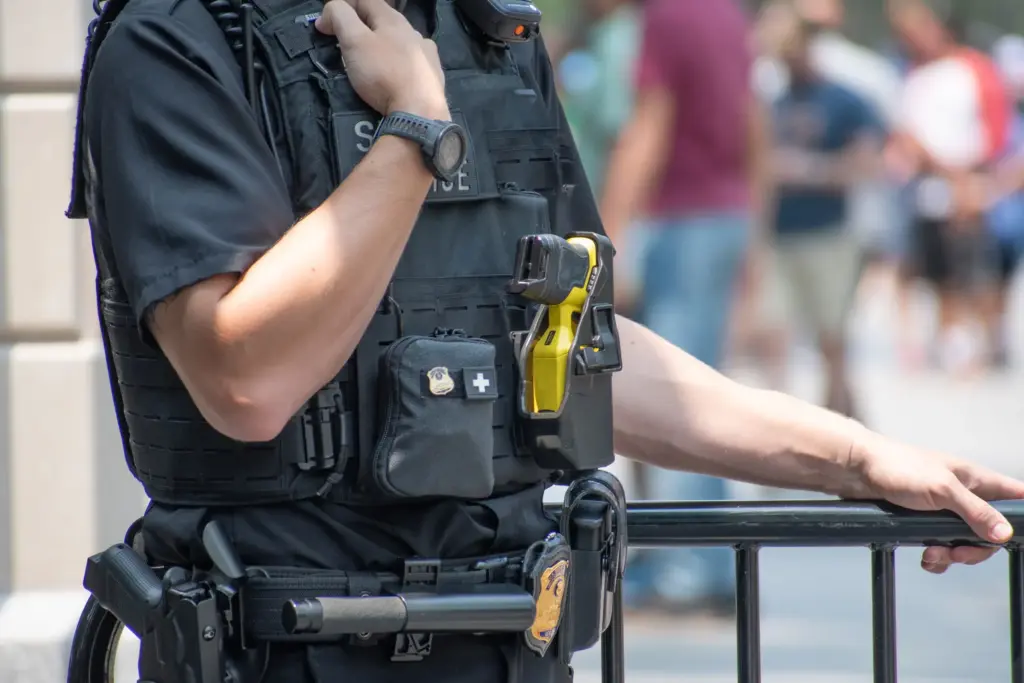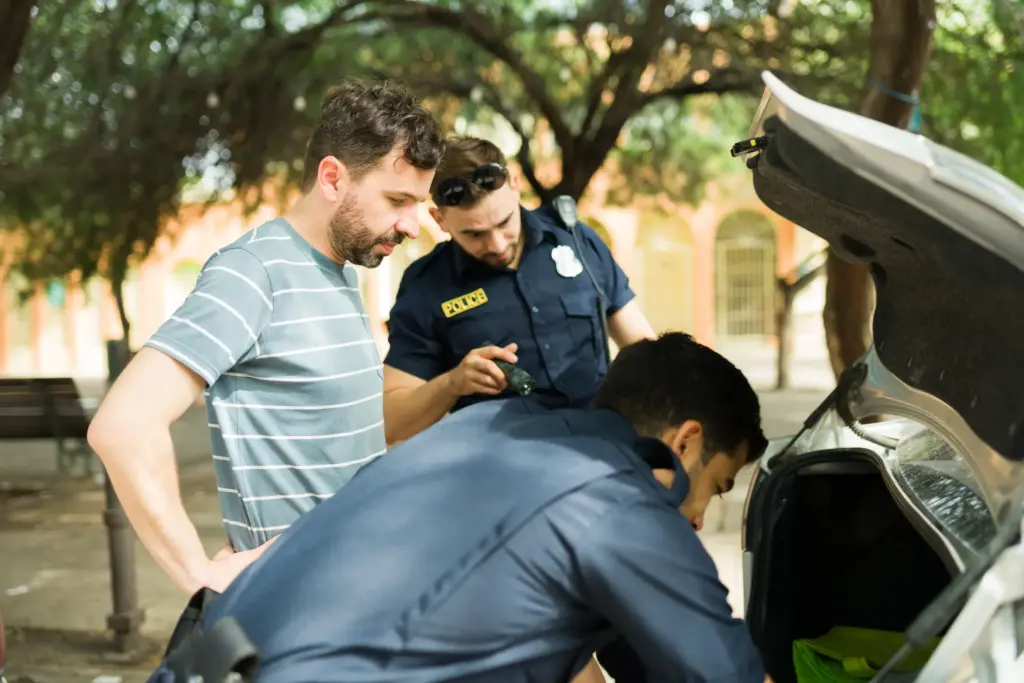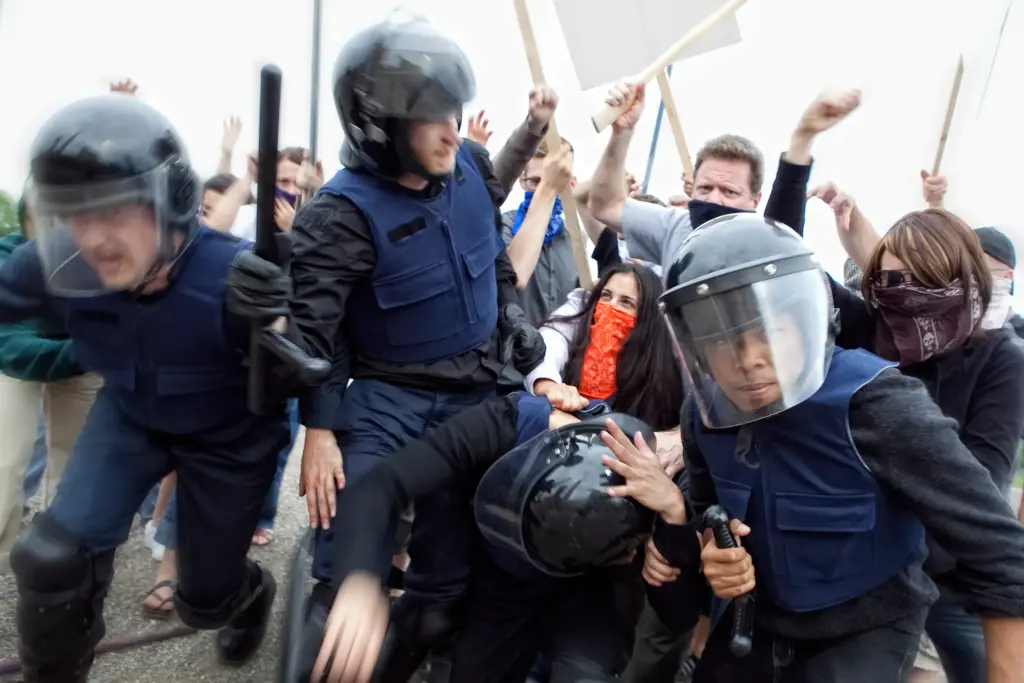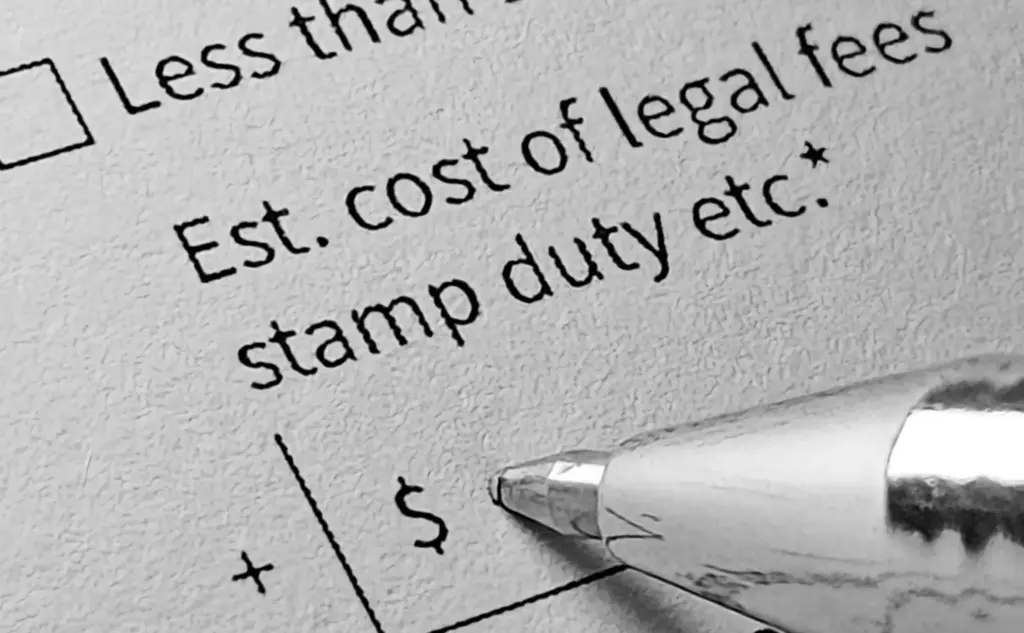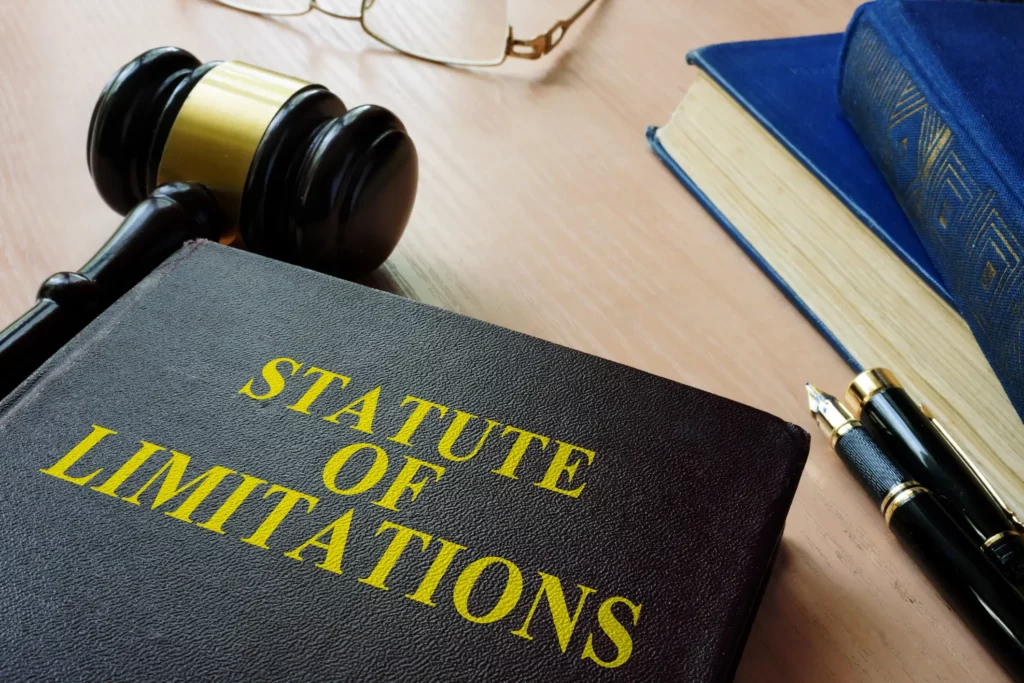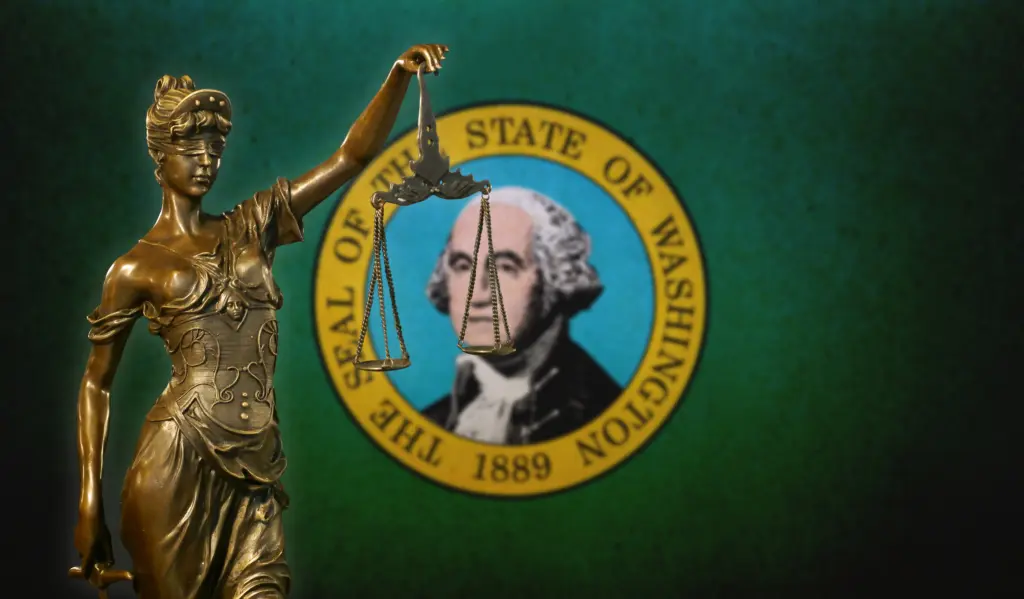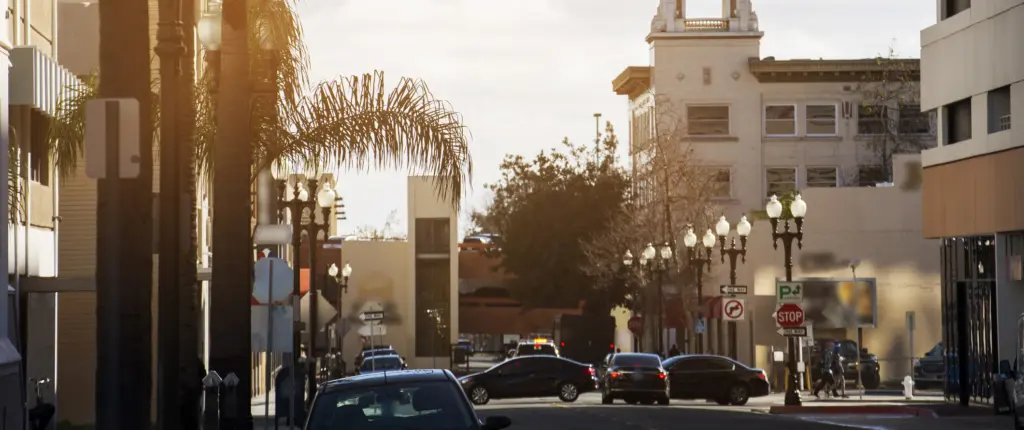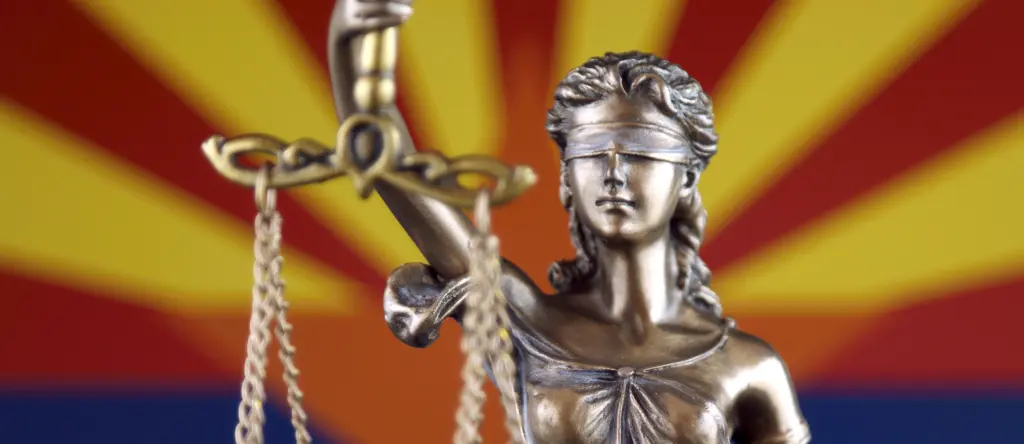Getting mistreated by the police is a traumatic experience that can leave lasting effects that can shake your sense of safety. Nobody should have to go through the nightmare of police misconduct. At West Coast Trial Lawyers, we’ve seen up close how these incidents—whether a wrongful arrest or excessive force—can leave you shaken, scared, and facing medical bills or lost work.
That’s why we’re here to help you fight back. This guide explains what police misconduct means, outlines your rights, provides clear steps to take, and shows how our police misconduct attorneys can stand by you to hold law enforcement accountable.
What Exactly Is Police Misconduct in California?
Police misconduct isn’t just a single act—it’s a range of actions that can cross the line from lawful policing into abuse. Unlike police brutality, which zeros in on excessive force (think baton swings, chokeholds, recklessly firing rubber bullets), misconduct covers a broader spectrum. It’s the stuff that makes you think, Wait, can they even do that?
In California, laws like the Bane Act (California Civil Code Section 52.1) and federal statutes like 42 U.S.C. Section 1983 defines and punishes these violations. Here’s what misconduct might look like:
Excessive Force
When an officer goes overboard, using more force than needed like tackling someone who’s already complying. According to California Penal Code Section 149, Every public officer who, under color of authority, without lawful necessity, assaults or beats any person, is punishable by a fine not exceeding ten thousand dollars ($10,000), or by imprisonment in a county jail not exceeding one year, or pursuant to subdivision (h) of Section 1170, or by both that fine and imprisonment.
False Arrest
Imagine you’re walking home, minding your own business, and suddenly you’re in handcuffs, dragged to a squad car without any real reason. That’s false arrest, and it violates California Penal Code Section 236, which prohibits unlawful detention. Legally, police need probable cause to arrest you, meaning they must have specific facts showing a fair probability you committed a crime. Most people think probable cause is just a guess, like an officer’s gut feeling you’re “up to no good.” It’s a higher bar than most people realize, like a witness seeing you break a law or contraband found on you. Without it, an arrest is illegal and the arresting officer can face legal charges.
Malicious Prosecution
Malicious prosecution occurs when a law enforcement officer initiates criminal charges against an individual without legitimate grounds, often driven by improper motives such as a personal vendetta. This conduct violates your rights under California Civil Code Section 52.1 (Bane Act) and 42 U.S.C. Section 1983.
To prove this, you must demonstrate four elements: the officer commenced a criminal proceeding against you; the proceeding terminated in your favor, such as through dismissal of charges; there was no probable cause to support the charges; and the officer acted with malice, evidenced by actions like falsifying reports or misrepresenting facts. For instance, if an officer alleges you committed assault, but bodycam footage confirms you didn’t, this evidence can prove your claim.
Denial of Medical Care
When you’re in custody and injured, whether from an arrest or an existing condition, officers are legally obligated to provide timely medical care. Failing to do so, such as ignoring your request for a doctor, violates California Code of Regulations, Title 15, Section 1200, which mandates adequate medical services for detainees. This isn’t just negligence; it can be life-threatening. Why might an officer deny care? Sometimes, it’s prejudice because they assume someone is faking pain based on their background or appearance.
Other times, it’s plain negligence, like dismissing a serious injury as “not a big deal” to avoid paperwork or effort. In high-pressure situations, officers might prioritize operational demands over your health, but that’s no excuse. For example, if you’re in a holding cell, visibly bleeding from an injury sustained during arrest, and officers refuse to call a medic despite your requests, that’s a clear violation.
Racial Profiling
Racial profiling happens when officers target you for stops or searches based on race or ethnicity, not evidence of wrongdoing, violating the Fourteenth Amendment’s Equal Protection Clause and California Penal Code Section 13519.4, which bans profiling. It might look like being pulled over for ‘looking out of place’ or repeatedly stopped in your own neighborhood.
Proving racial profiling is tough because bias is rarely admitted but patterns like frequent, baseless stops or data showing disproportionate targeting of your community can build a case. Document officer comments or record stops to support your claim.
Illegal Searches
Illegal searches occur when officers search your vehicle, home, or personal belongings without a warrant or valid exception, violating your Fourth Amendment right to be free from unreasonable searches and seizures, as well as California Penal Code Section 1538.5, which allows suppression of illegally obtained evidence.
This might involve an officer searching your car during a traffic stop without consent or probable cause, or entering your home without a warrant. Why do officers do this? Some may act out of overzealousness, assuming they’ll find evidence despite lacking legal grounds. Others might rely on bias, targeting individuals based on appearance or neighborhood. In some cases, inadequate training leads to ignorance of legal limits. Regardless of motive, these actions are unlawful.
Does It Change by State or County?
Federal laws like Section 1983 are there to allow lawsuits against officers for violating your constitutional rights, but California has its own level of protections. The Bane Act, for instance, lets you sue for violations of state or federal rights, which is a big deal. Los Angeles has a civilian oversight board, but smaller counties might just have the sheriff’s office investigating itself. A police misconduct attorney from WCTL knows how to navigate these local rules to get results.
Who’s on the Hook for Misconduct?
Those affected by police misconduct can potentially go after several liable parties for their injuries:
- The Officer: The one who crossed the line can be sued personally under Section 1983.
- The Department or City: If shoddy training or bad policies led to the misconduct, the municipality might be liable, per Monell v. Department of Social Services (1978).
- Bosses: Supervisors can get roped in if they turn a blind eye to the problem.
Are Cops Untouchable to Misconduct Charges?
Not quite. Officers often hide behind qualified immunity, a legal shield that protects them unless they violate a “clearly established” right. Sounds like a high bar, doesn’t it? An experienced police misconduct attorney can poke holes in immunity claims and hold officers accountable.
When Does Policing Turn Into Misconduct?
Officers are supposed to follow strict guidelines, like those in the California Peace Officer Standards and Training (POST) Manual, which stresses de-escalation and reasonable force. The Supreme Court’s Graham v. Connor (1989) ruling says force must match the situation—say, not tasering someone who’s just jaywalking. When officers ignore these standards, they’ve crossed into misconduct territory and can be punished to the fullest extent of the law.
How Common Is Misconduct in the Police Force?
Police misconduct isn’t a rare occurrence unfortunately. A 2021 California Department of Justice report logged over 17,000 complaints statewide in 2020, with about 1,700 tied to excessive force or civil rights issues. It’s a real problem, and it’s not going away on its own.
How Difficult is a Police Misconduct Case?
Pursuing a police misconduct case presents significant challenges, you might run into:
- Qualified Immunity: A legal doctrine shielding government officials, like police officers, from civil lawsuits unless they clearly violate established constitutional or statutory rights a reasonable person would know
- High Burden of Proof: You’ve got to show the officer’s actions were flat-out wrong and caused you harm.
- Tough Defenses: Police departments have a dedicated budget for lawyers and legal teams.
Despite these reasons, the U.S. Department of Justice data shows about 30% of Section 1983 cases that hit a trial end in a plaintiff’s win, and settlements are even more common than ever before.
What Should Your First Moves Be After Police Misconduct
If you’re hurting from a misconduct incident, you might feel overwhelmed. That’s okay—here’s a game plan to get you started:
Get Medical Help, ASAP
Head to a doctor, even if you think, It’s just a bruise. Injuries can worsen, and medical records are gold in court. They tie your pain directly to the incident and can serve as crucial evidence for your case.
Write It All Down
Grab a notebook or your phone and jot down the following info:
- The officers’ names and badge numbers (if you saw them).
- Police car plates.
- Witnesses’ names and numbers.
- Exactly when and where it went down.
- What happened, step by step.
- Take photos or videos of your injuries or the scene.
Hold Onto Evidence
The last thing on your mind, especially after dealing with hostile police, might be saving a ripped shirt or a cracked phone screen. But trust us—these items can speak volumes in your case. Physical evidence, like torn clothing, and damaged belongings, helps paint a clearer picture of what happened. Keep anything tied to the incident: whether it’s a broken watch, a dented car, or medical records from your injuries. Hold onto it.
Report It
Reporting police misconduct is a critical step to seek accountability. Depending on your situation, you may file with one or all of the following, and our police misconduct attorneys can guide you on the best approach:
- Internal Affairs: Submit a formal complaint to the police department’s Internal Affairs division, which is required to investigate under California Penal Code. Section 832.5. This is key for most cases, like excessive force during an arrest, to ensure an official record.
- Oversight Agencies: Contact the California Department of Justice or a local civilian review board, especially for serious violations like racial profiling or if you distrust the department’s internal process.
Filing with all may strengthen your case, but prioritizing Internal Affairs is often the first step, with others added based on the incident’s severity or lack of response.
Call a Lawyer Now
California’s Government Code Section 911.2 gives you just six months to file a Notice of Claim against the city or department. Miss that window, and you automatically waive your right to file a claim and recover compensation and justice for your injuries. Our police misconduct attorneys at WCTL will jump in to meet deadlines and start investigating.
Your Rights and How to Use Them
In California, you have strong legal protections to address police misconduct:
- Sue for Damages: Section 1983 and the Bane Act let you claim cash for medical bills, lost income, and emotional trauma.
- Demand Accountability: Your case can lead to officer discipline or policy fixes.
- Expect Fairness: The California Constitution and federal law say you’re protected from abuse.
What You Could Recover in a Police Misconduct Case
You might get paid for:
- Medical Costs: From ER visits to therapy down the line.
- Lost Pay: Money you missed out on while recovering.
- Pain and Suffering: For the nightmares and stress.
- Punitive Damages: To send a message that this nonsense won’t fly.
How to Win Your Case
Winning a police misconduct case typically requires proving several elements clearly. Here’s how you can effectively build your case:
- Establish Duty of Care– First, demonstrate clearly that the police officer had an obligation to act lawfully and uphold your rights. Officers are required to adhere to established policies and legal standards while interacting with the public.
- Prove Breach of Duty– You must show concrete evidence that the officer violated this obligation. This can include excessive force, unlawful detention or arrest, wrongful search and seizure, or discriminatory treatment. Examples of evidence might include video recordings, eyewitness testimonies, police reports, medical records, or expert witness analysis.
- Demonstrate Harm– Next, provide evidence that the misconduct directly caused you harm—whether physical, emotional, psychological, or financial. Medical documentation, therapist evaluations, and personal testimony can all help substantiate this element.
- Show Actual Damages– Finally, establish that you suffered tangible losses or damages as a result of the misconduct. These could include medical bills, lost income, emotional distress, property damage, or diminished quality of life. Precise documentation and clear financial records are critical.
Statute of Limitations for Police Conduct Cases
Deadlines matter—miss them, and you could lose your right to sue. If you’re thinking about filing a police misconduct lawsuit, it’s critical to understand that these cases have strict time limits, and they vary depending on the type of claim and who you’re suing. Here’s a breakdown:
- Government Tort Claims Act (State Claims Against Public Agencies):
Before suing a public agency or police department in California, you must file a Notice of Claim within six months of the incident. This is required under Government Code Section 911.2. If you miss this window, your case may be dismissed before it even starts. - Federal Civil Rights Claims (Section 1983):
For violations of your constitutional rights—such as excessive force, false arrest, or unlawful search and seizure—under 42 U.S.C. § 1983, you typically have two years from the date of the incident to file your lawsuit in federal court. - California’s Bane Act Claims (State Civil Rights Violations):
If your rights were violated through threats, intimidation, or coercion, you may also have a claim under the Bane Act (Civil Code § 52.1). These claims usually come with a two-year statute of limitations, but timing can vary depending on how the claim is framed and whether government entities are involved.
Bottom line: You can’t afford to wait. These timelines are strict, and if you miss a deadline, your case may be permanently barred—even if your claim is valid. Contact our firm immediately so we can evaluate your case and help preserve your rights.
Call WCTL: Let our Police Misconduct Attorneys Fight for You
Your fight isn’t just about you—it’s about making things right for everyone. Lawsuits push for change. California’s SB 1421 (2018) opened up police records, and AB 392 (2019) tightened deadly force rules, all because people spoke up.
However, we know dealing with the aftermath of police misconduct can make you feel like the deck stacked against you. But here’s the truth: The laws are on your side, and with West Coast Trial Lawyers, you’ve got a team ready to back you up. Our police misconduct attorneys will fight tooth and nail to get you justice and the compensation you deserve.
Don’t wait—deadlines are tight, and the sooner we start, the stronger your case. Call us at Call (213) 927-3700 for a free consultation or fill out our online contact form.
